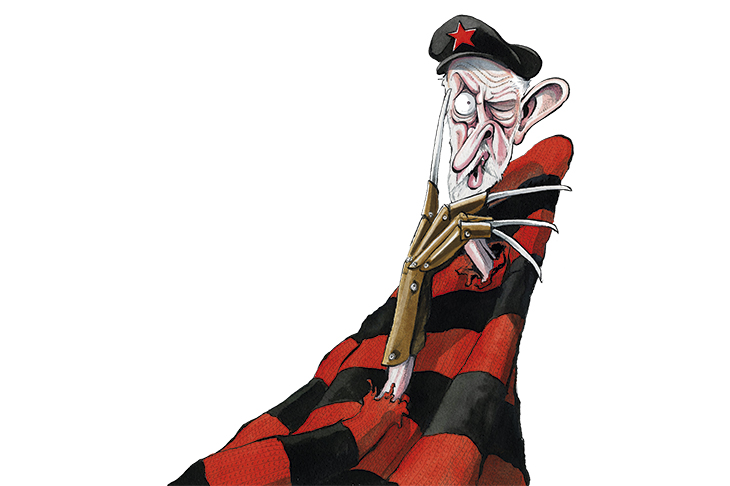Radicalism does not usually work out well for the Labour party. Michael Foot fought the 1983 general election on a hard-left manifesto famously dubbed ‘the longest suicide note in history’ and saw his party’s worst result since the first world war. But as next week’s UK general election approaches, despite running on an even more sweepingly statist program, Labour is rising in the polls. The most left-wing government in British history is now a real possibility.
On the face of it, this makes no sense. Why, after the chaos of the last hung parliament, would voters choose another one? The prospect of Jeremy Corbyn as prime minister, propped up by the Liberal Democrats, the Scottish National party or both — plotting second referendums on Brexit and Scottish independence — is too traumatic to contemplate. That doesn’t mean it won’t happen. When was the last time that a major election delivered the expected result?
An important shift in this painful, somewhat surreal election campaign is that while the Tories have already successfully squeezed the Brexit party’s vote, Labour could still take lots more support from the flailing Liberal Democrats. Jo Swinson’s ‘Revoke’ policy, of canceling Brexit without even a second referendum, boosted the Lib Dems when the Tories seemed to be heading for a ‘No Deal’ exit. But after Johnson secured a Brexit deal, ‘Revoke’ looked extreme. Labour’s Brexit stance — renegotiation, then referendum — now strikes many Remainers as the more plausible position.
A recent YouGov ‘super-poll’ predicted a healthy 68-seat Tory majority, based on ‘bottom-up’ constituency-level analysis and a huge 100,000-strong voter sample. But in no fewer than 30 constituencies, the YouGov polling fine print showed the Conservatives winning by less than 5 percent. Losing just a slither of support could switch enough seats to knock more than 40 off the Tory majority. A few more near misses, a clear danger with so many three- and four-way constituency battles in the offing, and the Tories would be clinging on to power by a couple of seats.
At best, Boris Johnson would then be back to counting each and every MP to get his legislation through the Commons. Brexit would again be in doubt — with a handful of rebels able to tip the balance. Cue a debilitating impact on investment and business more generally, to say nothing of the nation’s collective psyche.
A hung parliament would still result in Prime Minister Corbyn, because the Conservatives would have no partners. The Democratic Unionist party has made it clear that it can’t and won’t back the Tory Brexit deal. The Lib Dems would be unlikely to offer a helping hand. So the nightmare would be real: Magic Grandpa running the fifth-biggest economy on earth. But the real power would lie with Chancellor John McDonnell — whose hobbies listed in Who’s Who, alongside ‘gardening’ and ‘reading’, include ‘generally fermenting (sic) the overthrow of capitalism’.
To give the Corbynites their due, they mean it. On entering Downing Street, Labour would start immediately to implement its manifesto — knowing its time in office could end at any moment. Were that to happen, the UK would be at the mercy of tax-and-spend plans that are simply extraordinary in terms of their scope and scale. Corbyn’s radical program takes a knife to budgetary prudence — the fiscal equivalent of a slasher movie.
The first move would be to raise the money. Labour has pledged to hike day-to-day government spending by £83 billion ($109 billion) a year, all of it funded by extra taxation. That’s almost double what Corbyn promised ahead of the 2017 election. Another £55 billion ($72 billion) a year is earmarked for capital spending — 3 percent or so of GDP, financed by more borrowing. Then comes the £400 billion ($525 billion) ‘-National Transformation Fund’, which the party says will ‘add to the government’s debt’ but isn’t in the related costings document. And don’t forget the proposed nationalizations — including rail, water, energy companies, buses and broadband — costing several hundred billion more. These are truly colossal sums.
Labour claims its tax rises ‘won’t hit ordinary people’, as they will come entirely from higher taxes on the City, other companies, and people earning over £80,000 ($105,000). ‘Simply not credible,’ says the Institute for Fiscal Studies, judging that Corbyn’s program would ‘involve higher tax burdens on people of average incomes’, while leaving Britain with ‘just about the most punitive corporate tax system in the world’. You might agree with that bleak assessment or you might not. But there should no doubt Labour wouldn’t shy away from implementing its radical program.
It would soon backfire. A plunging pound, falling through parity against the euro and then the dollar, would spark inflation — wiping out the recent growth in real wages. And McDonnell’s plans assume that large tax changes have no effect on behavior. Labour says £8 billion ($10.5 billion) will be raised each year by a financial transactions tax, ignoring that punitive levies cause investors to put their money elsewhere.
The lesson of the past few years is that lower tax rates generally mean higher tax yields. As corporation tax gradually fell under the Tories, from 28 to 19 percent, the resulting extra activity boosted annual revenues from £43 billion ($56 billion) to £55 billion ($72 billion). Labour reckons yanking the rate back to 26 percent will raise an extra £23 billion ($30 billion) — which flies in the face of the economic evidence. It is more likely that investment and related tax receipts will plummet, as capital flees the UK.
Under Corbyn, state spending would climb towards 50 percent of GDP. Nations such as France and Sweden have government spending at this level, but their tax takes have been much higher for a generation and more. Moving the UK from a small-state to a big-state model so quickly, in such a nakedly ideological manner, would see government debt balloon, causing a spike in borrowing costs at a time when debt markets are already dangerously fragile.
Perhaps the most extraordinary part of the McDonnell agenda is the plan to seize 10 percent of the shares in every big UK company. This is straightforward expropriation — the stuff of tinpot dictatorships. If any British government did this, our status as a place for world-class investment (and all the related jobs) would vanish. That’s the real significance of Corbyn’s program, beyond the gargantuan, pie-in-the-sky spending numbers. It is openly anti-capitalist, confiscating property in a way that will harm those it seeks to help.
As Britain prepares for the most important election in over 70 years, many centrist Conservative voters — convinced Johnson will win — may abstain or cast their vote elsewhere. Yet a Tory victory is far from assured.
In 2017 a supposedly unelectable Jeremy Corbyn came within a whisker of Downing Street. Just a few thousand extra votes, sprinkled across a dozen constituencies, would have done it. Since this election was called at the end of October, a record 3.9 million people have registered to vote. Over two-thirds of them are under 35 years old — a demographic that typically backs Labour, particularly now, when so many young adults are spending half their wages on rent and can’t buy a place to live. They can’t envisage this situation changing any time soon. Detailed opinion surveys show that more than three quarters of the electorate think the economy is unfairly rigged in favor of the rich and half worry that young people will have a worse life than their parents. That puts millions in the mood for radicalism.
So don’t think Nightmare on Downing Street couldn’t happen, because it could. Coming to a television screen near you — on Friday the 13th.
This article was originally published in The Spectator’s UK magazine. Subscribe to the US edition here.



















